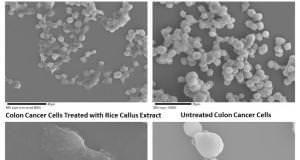Aspirin May Fight Cancer by Slowing DNA Damage
Aspirin is known to lower risk for some cancers, and a new study led by a UC San Francisco scientist points to a possible...
Dementia Costs Top Those For Heart Disease Or Cancer, Study Finds
The monetary cost of dementia in the United States ranges from $157 billion to $215 billion annually, making the disease more costly to the nation than either heart disease or cancer, according to a new RAND Corporation study. The greatest economic cost of dementia is associated with providing institutional and home-based long-term care rather than medical services, according to the findings published in the April 4 edition of the New England Journal of Medicine.
Rice-Cell Cocktail Tough On Cancer Cells, Nice To Normal Cells
Juice from rice cells can knock out two kinds of human cancer cells as well or better than the potent anti-cancer drug Taxol, a Michigan Technological University scientist has discovered in laboratory tests. Plus, it does something Taxol can't do: it plays nice with normal cells.
Popular Pain Relievers May Reduce Risk Of Bladder Cancer
Dartmouth researchers have found that duration of ibuprofen use was associated with a reduced risk of bladder cancer in patients in northern New England, which has a high mortality rate of this disease. In a 2012 collaborative project with the National Cancer Institute, Margaret Karagas, PhD, co-director, Cancer Epidemiology & Chemoprevention program at Norris Cotton Cancer Center, and Professor of Community and Family Medicine at the Geisel School of Medicine at Dartmouth, and Richard Waddell, D.Sc, Research Assistant Professor of Medicine at the Geisel School of Medicine, looked for connections between ibuprofen use and bladder cancer.
Marijuana Fights Cancer And Helps Manage Side Effects, Researchers Find
Mounting evidence shows ‘cannabinoids’ in marijuana slow cancer growth, inhibit formation of new blood cells that feed a tumor, and help manage pain, fatigue, nausea, and other side effects.
BPA’s Real Threat May Be After It Has Metabolized, Linked to...
Bisphenol A or BPA is a synthetic chemical widely used in the making of plastic products ranging from bottles and food can linings to toys and water supply lines. When these plastics degrade, BPA is released into the environment and routinely ingested.
How Infection Can Lead To Cancer
One of the biggest risk factors for liver, colon or stomach cancer is chronic inflammation of those organs, often caused by viral or bacterial infections. A new study from MIT offers the most comprehensive look yet at how such infections provoke tissues into becoming cancerous.
Key Gene Found Responsible For Chronic Inflammation, Accelerated Aging And Cancer
Researchers at NYU School of Medicine have, for the first time, identified a single gene that simultaneously controls inflammation, accelerated aging and cancer. "This was certainly an unexpected finding," said principal investigator Robert J. Schneider, PhD, the Albert Sabin Professor of Molecular Pathogenesis, associate director for translational research and co-director of the Breast Cancer Program at NYU Langone Medical Center.
Task Force Recommends Against PSA-Based Screening For Prostate Cancer
Following a period for public comment, the United States Preventive Services Task Force (USPSTF) released its final recommendation for prostate cancer screening. The Task Force now recommends against PSA-based screening for all men, regardless of age. The final recommendations are being published early online in the May 22 issue of Annals of Internal Medicine, the flagship journal of the American College of Physicians (ACP).
High Doses Of Certain Dietary Supplements Increase Cancer Risk
Beta-carotene, selenium and folic acid -- taken up to three times their recommended daily allowance, these supplements are probably harmless. But taken at much higher levels as some supplement manufacturers suggest, these three supplements have now been shown to increase the risk of developing a host of cancers.
Coordinating The Circadian Clock: Molecular Pair Controls Time-Keeping And Fat Metabolism
The 24-hour internal clock controls many aspects of human behavior and physiology, including sleep, blood pressure, and metabolism. Disruption in circadian rhythms leads to increased incidence of many diseases, including metabolic disease and cancer. Each cell of the body has its own internal timing mechanism, which is controlled by proteins that keep one another in check.
















